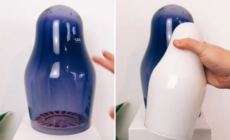-
Diddy Accused of Rape, Assault in Lawsuits Filed by Three Men, reports - 12 mins ago
-
How Covid Can Change Your Gut - 13 mins ago
-
Column: Is it time for California’s Latino Legislative Caucus to let in Republicans? - 34 mins ago
-
Why Blocking The Onion From Buying Infowars Was ‘Right Decision’—Attorney - 47 mins ago
-
European Central Bank Cuts Interest Rates as the Economy Weakens - 57 mins ago
-
Two arrested in ‘pig butchering’ that cost San José man $170,000 - about 1 hour ago
-
Churches Will No Longer Provide Sanctuary for Migrants Under Trump - about 1 hour ago
-
How America Turned Allies into Enemies in Afghanistan - 2 hours ago
-
What sleeping in prison is like: Moldy beds, bright lights, 24/7 noise - 2 hours ago
-
Mystery Thrifted Items Spark Theories Online: ‘Quest for Answers’ - 2 hours ago
Want to Live to 100? ‘Superagers’ Stem Cell Research Could Make It Possible
Stem cells have been taken from the blood of ‘superagers’ – people aged 100 or more – and reprogrammed so that they are again capable of becoming any cell type in the body in research that could open the door to a better understanding of how cells age, and how some of us become more resistant to diseases of aging such as Alzheimer’s.
“Ageing is unavoidable as are the laws of physics,” Thomas Perls, Professor of Medicine and Geriatrics at Boston University Chobanian & Avedisian School of Medicine who conducted the breakthrough stem cell research with Dr George Murphy, a stem cell biologist based at the same School, told Newsweek.
“But we do believe that one can slow aging and avoid or at least delay aging related diseases so that people can live longer while compressing the time they experience disease or disability until the relative end of their lives,” said Perls, who runs the largest study of people 100 years and older – the New England Centenarian Study.
“Thats what the centenarians do naturally.”

sandorgora/Getty Images
Pearls began the Centenarian Study in 1995 when he was training to be a geriatrician at Harvard. At the beginning there were about 50 centenarians involved, and since then the study has enrolled about 2,500 centenarians and 600 offspring. The oldest participant in the study lived to 119.
The ability to reprogram the stem cells of very old people is a ‘game changer’, said Perls, in reference to the scientific study of diseases of ageing.
“Instead of just finding genes and complicated combinations of proteins associated with extreme survival,” said Perls, “with Dr Murphy’s lab we can now study brain cells, for example, of our ‘superagers’ to discover the biological mechanisms that slow the ageing of these cells can that make them resilient against diseases like Alzheimer’s disease.”
“It also entirely skips the test of looking for and testing those mechanisms in mice or other mammals. It will speed up our discoveries by years.” The Boston-based scientists have chosen to share their centenarian data with the world.
“Any scientists studying ageing or aging-related diseases may find these banked cells to be useful in making or testing their discoveries,” said Perls. “They are far too precious and unique a resource to keep to ourselves.”
Perls doesn’t regard ageing as a disease that can be treated, or even cured, but he believes science can reduce its impact on our lives.
In good news for the baby-boom generation (born 1946 to 1964), now aged between 60 and 78, Perls believes that as many as 5 to 10% of them could live to 100 or older.
Source link















